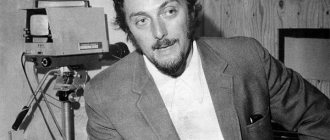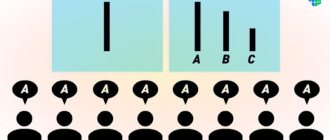Advantages and disadvantages
In psychology, a number of advantages and disadvantages of experiment are highlighted. Pros:
- You can repeat the event under study to confirm the data or obtain new information.
- High accuracy of the results obtained.
- You can select any moment of the event being studied for in-depth study.
- Ability to manipulate independent variables to obtain new information.
Minuses:
- Deliberate influence on the psyche of the subject.
- Possibility of obtaining an aggressive reaction to the created conditions.
Experiments are carried out after passing psychological tests, so as not to harm the subject.
Types of experimental research in psychology
All psychological studies are divided into several groups:
- Theoretical research.
- Empirical research.
- Applied research.
Theoretical studies can be and, in fact, are included in any research activity, since they are focused on collecting information about the object of research and developing its theoretical basis.
Empirical research is based on the perception of the surrounding world by the senses, real observation of the objects and processes being studied, as well as the creation of experimental conditions that exactly correspond to the mental process being studied. At the same time, the study combines various methods and techniques.
Applied psychological research is focused on solving a certain group of problems of psychological orientation, resolving problems that arise in various spheres of an individual’s life.
Each psychological study, regardless of its group affiliation, consists of a variety of experimental methods.
The following types are distinguished:
- A natural experiment is carrying out research work under real operating conditions of the test object. Such an experiment is carried out in various areas of human activity, making it possible to understand and evaluate the psychological factors of committing a particular act, to evaluate their dynamics and structure;
- A laboratory experiment is conducting research in unreal conditions of the existence of an object, and in artificial conditions as close as possible to them. The results of the experiment are subsequently applied and evaluated in the real world;
- Formative experiment - conducting research based on a combination of teaching methods, education, training, and psychological analysis. The methods used to implement this experiment include various trainings, role-playing and business games, and the construction of situational models. This method is of great importance in psychology, since it allows not only to obtain some data, but also creates conditions for the personal development of the objects of experimental activity.
The results of any psychological experiment require a mathematical justification. It creates positive conditions for an adequate interpretation of facts. In addition, this makes it possible to determine indicators that affect the object of research and its parameters, to identify patterns of development of a particular process, situation, object, and to find areas of the expected effect of experimental activity.
1.3. Psychodiagnostic methods
Psychodiagnostics is part of most ascertaining experiments. At the same time, the choice of specific research methods is determined by the goals and objectives of the experiment, the age and psychological characteristics of the children. Diagnostic techniques used in childhood involve conducting conversations, studying answers to questions, and also using projective methods (drawing tests, game situations, etc.). The latter are based on the principle of transferring one’s own needs, problems, qualities, and relationships to other people or other objects. So, children can be asked to describe the plot in the picture, or draw something, accompanied by explanations. At the same time, the child gives explanations based on his experience, endowing objects with his own concerns and experiences. A variation of the technique is also the “Unfinished Phrases” method, where the child is asked to independently complete the statement.
If the researcher has the goal of studying a group of children (relationships, psychological climate, leadership, etc.), sociometric methods will be effective. The most common option for studying a group in sociometry is to identify “stars” (the most popular children) in the group; preferred; children who have almost no sympathy in the team; isolated and rejected (children most in need of psychological help).
As noted, testing for young children is rare. However, for preschool and primary school age, test methods have been developed that are based on fairy tales or picture fragments, and also involve receiving some kind of reward (incentive). There are also adapted children's versions of the Cattell and Wechsler multifactor tests, the Luscher color test, etc.
General information
Robert Woodworth, who published his classic textbook on experimental psychology (Experimental psychology), defined an experiment as a structured study in which the researcher directly changes some factor (or factors), holds the others constant, and observes the results of systematic changes. He considered the control of the experimental factor
, or in Woodworth's terminology, the "independent variable", and tracking its effect on
the observed consequence
, or "dependent variable". The experimenter's goal is to keep all conditions constant except one—the independent variable.
In a simplified example, the independent variable can be considered as a relevant stimulus
(
St(r)
), the strength of which is varied by the experimenter, while the dependent variable is the reaction (
R
) of the subject, his psyche (
P
) to the influence of this relevant stimulus.
However, as a rule, the desired stability of all conditions, except for the independent variable, is unattainable in a psychological experiment, since almost always, in addition to these two variables, there are also additional variables, systematic irrelevant stimuli
(
St(1)
) and random stimuli (
St(2)
), leading to systematic and random errors, respectively. Thus the final schematic representation of the experimental process looks like this:
Therefore, in an experiment, three types of variables can be distinguished:
- Independent variable
- Dependent Variable
- Additional variables (or external variables)
So, the experimenter is trying to establish a functional relationship between the dependent and independent variables, which is expressed in the function R
=f(
St(r)
), while trying to take into account the systematic error that arose as a result of the influence of irrelevant stimuli (examples of systematic error include the phases of the Moon, time of day, etc.).
To reduce the likelihood of the impact of random errors on the result, the researcher seeks to conduct a series of experiments (an example of a random error could be, for example, fatigue or a speck of dust getting into the subject’s eye).
The main objective of the experimental study
The general goal of psychological experiments is to establish the existence of a connection R
=f(
S, P
) and, if possible, the type of function f (there are various types of relationships - cause-and-effect, functional, correlation, etc.).
In this case, R
is the subject’s reaction,
S
is the situation, and
P
is the subject’s personality, psyche, or “internal processes.” That is, roughly speaking, since mental processes cannot be “seen,” in a psychological experiment, based on the reaction of the subjects to stimulation regulated by the experimenter, some conclusion is made about the psyche, mental processes or personality of the subject.
Stages of the experiment
In each experiment, the following stages can be distinguished. The first stage is setting the problem and goal, as well as constructing an experimental plan. The experimental plan should be built taking into account accumulated knowledge and reflect the relevance of the problem.
Validity in a psychological experiment
As in natural science experiments, so in psychological experiments, the cornerstone is the concept of validity: if the experiment is valid, scientists can have some confidence that they measured exactly what they intended to measure. Many measures are taken to ensure all types of validity are met. However, it is impossible to be absolutely sure that in any, even the most well-thought-out study, all validity criteria can be completely met. A completely flawless experiment is unattainable.
Classification
Experiences are classified according to various factors.
The division depends on the conditions of the experiment:
- Providing natural conditions for activities. The main point of such experiments is that the experimenter cannot control the conditions under which they are conducted. The main task is to obtain high external validity.
- Laboratory research. The experimenter prepares in advance all the conditions that he can control. The main goal is to obtain high internal validity. To control external manifestations, two techniques are used - constancy and randomization.
Depending on the impact on the subject, several more groups are distinguished:
- Pathopsychological experiment. The main task is to make a quantitative and qualitative assessment of thinking processes.
- Formative experiment. Throughout the experiment, the experimenter attempts to permanently change certain qualities of the participant. In addition to this, it develops those qualities that existed initially.
- Ascertaining experiment. There are no irreversible changes or development of existing qualities.
Depending on the level of awareness:
- The purpose of the experiment is explained to the subject and the actions taken are listed.
- The subject does not know the purpose of the experiment.
- The subject is told a little about the experience, withholding basic information.
There are situations when psychological experiments are carried out without the permission of the subject. This way you can get the most up-to-date information.
Boy raised like a girl
This experiment is one of the most inhumane in history. It, so to speak, was held from 1965 to 2004 in Baltimore (USA). In 1965, a boy named Bruce Reimer was born there, whose penis was damaged by doctors during a circumcision procedure. The parents, not knowing what to do, turned to psychologist John Money and he “recommended” that they simply change the gender of the boy and raise him as a girl. The parents followed the “advice”, gave permission for gender reassignment surgery and began raising Bruce as Brenda. In fact, Dr. Money has long wanted to conduct an experiment to prove that gender is determined by upbringing and not by nature. The boy Bruce became his test subject.
Despite the fact that Mani noted in his reports that the child was growing up as a full-fledged girl, parents and school teachers argued that, on the contrary, the child exhibited all the character traits of a boy. Both the child’s parents and the child themselves experienced extreme stress for many years. A few years later, Bruce-Brenda decided to become a man: he changed his name and became David, changed his image and had several operations to “return” to male physiology. He even married and adopted his wife's children. But in 2004, after breaking up with his wife, David committed suicide. He was 38 years old.
What can be said about this “experiment” in relation to our everyday life? Probably, only that a person is born with a certain set of qualities and predispositions determined by genetic information. Fortunately, not many people try to make daughters out of their sons or vice versa. But, nevertheless, when raising their child, some parents do not seem to want to notice the characteristics of their child’s character and his developing personality. They want to “sculpt” the child, as if from plasticine - to make him the way they themselves want him to be, without taking into account his individuality. And this is unfortunate, because... It is precisely because of this that many people in adulthood feel unfulfilled, frailty and meaninglessness of existence, and do not receive pleasure from life. The small is confirmed in the big, and any influence we have on our children will be reflected in their future lives. Therefore, you should be more attentive to your children and understand that every person, even the smallest one, has his own path and we must try with all our might to help him find it.
The experiments we reviewed in this article, as you might guess, represent only a small part of the total number ever conducted. But even they show us, on the one hand, how multifaceted and little studied the human personality and psyche are. And, on the other hand, what a huge interest a person arouses in himself, and how much effort is made so that he can understand his nature. Despite the fact that such a noble goal was often achieved by far from noble means, one can only hope that a person has somehow succeeded in his endeavor, and experiments that are harmful to a living being will stop being carried out. We can say with confidence that it is possible and necessary to study the human psyche and personality for many more centuries, but this should be done only based on considerations of humanism and humanity.
Psychological and pedagogical experiment
A psychological-pedagogical experiment, or formative experiment, is a type of experiment specific exclusively to psychology, in which the active influence of the experimental situation on the subject should contribute to his mental development and personal growth.
A psychological and pedagogical experiment requires very high qualifications on the part of the experimenter, since unsuccessful and incorrect use of psychological techniques can lead to negative consequences for the subject.
A psychological-pedagogical experiment is one of the types of psychological experiments.
During a psychological and pedagogical experiment, the formation of a certain quality is assumed (that is why it is also called “formative”), two groups usually participate: experimental and control. Participants in the experimental group are offered a specific task, which (in the opinion of the experimenters) will contribute to the formation of a given quality. The control group of subjects is not given this task. At the end of the experiment, the two groups are compared with each other to evaluate the results obtained.
The formative experiment as a method appeared thanks to the theory of activity (A.N. Leontiev, D.B. Elkonin, etc.), which affirms the idea of the primacy of activity in relation to mental development. During a formative experiment, active actions are performed by both the subjects and the experimenter. A high degree of intervention and control over the main variables is required on the part of the experimenter. This distinguishes experiment from observation or examination.
Recent Entries
- 1. Features of psychology as a science, its tasks
- Types of student activities
- General concept of intelligence
- General characteristics of a person’s motivational sphere
- Diagnosis of selectivity of attention
- Conflicts as the struggle of animals for vital resources
- Subject and method of pedagogical conflictology
- Dr. Freud and his teachings
- Social ecology is a science and educational subject in the professional training of social work specialists
- Analysis of case studies of therapy
- Development of Russian psychology in the 19th century
- Basic principles and methods of managerial psychology 2
- Coping with difficult life situations
- Guidelines for conducting practical classes in sections 1−3 of the discipline “Psychology”
- in the course "Psychology" 2
Principles and basis of experimental psychology
Experimental psychology is a general term for any type of scientific psychological research conducted using experimental methods. It does not lie in some special type of psychology, but in a general methodological approach that covers different areas of psychological science.
Experimental methodology within psychology can be reduced mainly to laboratory research (less often, to natural experiments). In the process of research in laboratory conditions, preliminary planning and organization of the most correct experiments are carried out, which relate to different areas of psychological science, including almost all areas of applied psychology.
An important role for success in the development of experimental psychology is played by the development of effective experimental methods for studying problems and issues that are related to the psychophysiology of perception, sensations, development, attention, consciousness, learning, memory, thinking, etc.
In modern science, experimental approaches have become actively used in social psychology and in the study of the psychological side of emotions and motivation.
The methodology of experimental psychology is based on several principles. First of all, these are general scientific methodological principles:
- determinism (human behavior and mental phenomena are a consequence of certain causes and have a fundamental explanation),
- objectivity (the object of knowledge must be independent of the knowing subject, while it must be fundamentally knowable through action),
- falsifiability (the presence of a methodological ability to refute a theory that claims to be scientific through setting up an experiment).
Psychology-specific principles include the following:
- The unity of the mental and physical (with the help of the nervous system the manifestation and course of mental processes is ensured, but reducing mental phenomena to physiological ones is not possible);
- The unity of activity and consciousness (consciousness is active, and activity is conscious, while an experimental psychologist studies behavior formed through the close interaction of personality and situation);
- The principle of development (genetic principle, the principle of historicism), according to which the psyche of the subject is the result of long-term development in phylogenesis and ontogenesis.
- A systemic-structural principle, which states that any mental phenomena must be considered as integral processes, and the impact is always carried out on the psyche as a whole, and not on its individual part.











